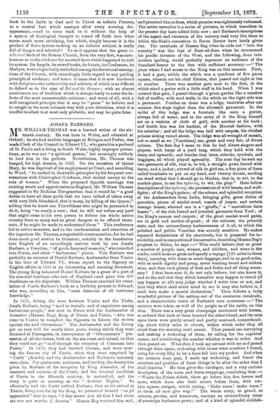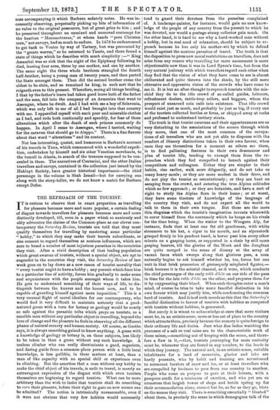JOSAFA BARBARO.
MR. WILLIAM THOMAS was a learned writer of the six- teenth century. He was born in Wales, and educated at Oxford ; he studied modern languages at Bologna and Padua, was made Clerk of the Council to Edward VI., who gave him a prebend of St. Paul's and a living in South Wales, highly improper promo- tions, as he was not " a spiritual person," but seemingly unlikely to lead him to the gallows. Nevertheless, Mr. Thomas was hanged, for high treason, in 1553. On the accession of Queen Mary, he was deprived of his employment at Court, and according to Wood, " he sucked in damnable principles by his frequent con- versations with Christopher Goodman, that violent enemy to the rule of women." When the proposed Spanish marriage was exciting wrath and apprehension in England, Mr. William Thomas suggested to Sir Nicholas Throgmorton that it would be " a good devise to have all these perils that we have talked of taken away with very little bloodshed, that is to say, by killing of the Queen ;" adding that he knew one Fitzwilliams who might be persuaded to do it, being "so manly a man ; that he will not refuse any peril that might come to his own person to deliver his whole native country from so many and so great dangers as be offered there- unto, if he might be made to understand them." This conference led to active measures, and to the condemnation and execution of the ingenious Mr. Thomas, a regrettable consummation, for he had done much good service to literature, notably in the translation into English of an exceedingly curious work by one Josafa Barbaro, a Venetian, "of goode fame and memorie," who travelled into Persia, and other " barbarouse " places. This Barbaro was probably an ancestor of Daniel Barbaro, Ambassador from Venice in the time of Edward VI., whose report to the Signory on English affairs in 1551 is an interesting and amusing document. The young King honoured Daniel Barbaro by a grant of a part of his armorial bearings—the rose of England—and gave him 600 doubloons on his departure. William Thomas executed his trans- lation of Josafa Barbaro's book as a birthday present to Edward, who was, according to him, " most desirouse of all vertuouse knowledge."
In 1471, during the wars between Venice and the Turks, Josafa Barbaro, being " used to travaile, and of experience among barbarouse people," was sent to Persia with the Ambassador of Assambei (Hassan Beg), King of Tanris and Persia, " who was come to Venice to compfort the Signoria to folowe the wtxres against the said 0 ttomanno." The Ambassador and the Envoy got on very well for nearly three years, during which they were detained at Farnagosta, in consequence of " Ottomanno's " pos- session of all the towns, both on the sea coast and inland, so that they could not go " sauf through the countrey of Caraman into Persia." In 1474, they had reached Chesan, and were near- ing the famous city of Tauris, when they were surprised by " Corbi " (Kurds), and the Ambassador and Barbaro's secretary were slain. For quaintness, acuteness, and lucidity, the description given by Barbaro of his reception by King Assambei, of the manners and customs of the Court, and the internal condition of Persia in the fifteenth century, is unrivalled, and the story is quite as amusing as the " Arabian Nights." So effectually had the Corbi robbed Barbaro, that on his arrival at Tauris, being sent for by the King, he presented himself "so yll apparailed " that he says, "I dair assure you all that I had about me was not worthe ij. ducates." Hassan Beg received him well,
and promised him redress, which promisawas righteously redeemed. The entire narrative is a series of pictures, to which travellers -in the present day have added little new ; and Barbaro's descriptions of the aspect and resources of the country read very like those to which the Shah's concession to Baron Reuter have lately given rise. The cavalcade of Hassan Beg when he rode out " into the country" was like that of Nasr-ed-deen when he commenced his pacific invasion of the West, and the following, done into modern spelling, would probably represent an audience of the Standard-bearer to the Sun with sufficient accuracy :—" The place where I had access to the King was on this manner. First, it had a gate, within the which was a quadrant of five paces square, wherein sat his chief Estates, that passed not eight or ten in number. There was another gate near to the first, in the which stood a porter with a little staff in his hand. When I was entered that gate, I passed through a-green garden like a meadow full of truffles, with mud walls, in the which on the right side was a pavement. Further on there was a lodge, vaultwise after our manner, five steps higher than the aforesaid pavement. In the midst of this lodge was a fountain like unto a gutter, always full of water, and in the entry of it the King himself sat on a cushion of cloth of gold, with another at his back ; and beside him was his buckler, of the Moorish fashion, with his scimitar ; and all the lodge was laid with carpets, his chiefest princes sitting round about. The lodge was all wrought of mosaic, not so-small as we [Venetians] use, great and very fair, of divers colours. The first day I came to him he had divers singers and players, with harps of a yard long, which they hold with the sharp end upwards ; and besides that lutes, rebecks, cymbals, and bagpipes, all which played agreeably. The next day he sent me two garments of silk, that is, to wit, a straight gown furred with barco, and a jacket ; atowel of silk to gird me, a fine piece of linen called bumbasin to put on my head, and twenty ducats, sending me word withal that I should go to Maiden, that is, to wit, to the market-place, to see the tafarraj, to wit, the play." Here follow descriptions of the tafarraj, the processions of wild beasts, and wolf- fights ; of the King's palace; of the solemn and splendid reception of the Ambassadors from India, bringing gifts, great dishes of porcelain, pieces of sandal-wood, vessels of jasper, and certain strange beasts, whereof one is a " giraffa," a " marvellous faire beaste "; of the rich furred and jewelled garments from Yezd ; of the King's cameos and carpets ; of the great sandal-wood gates, set in gold and mother-of-pearl ; of the retinues, the princely state, and the extraordinary barbarousness of it all, to which the polished and politic Venetian was acutely sensitive. He makes repeated declarations of his exactitude, but is prepared for in- credulity, and in one portion of his narrative, describing Hassan Beg's progress to Shiraz, he says :—" Who could believe that so great a number of people, men, women, and children, and some in the cradle, could make so great and speedy a voyage [120 miles in three days], carrying with them so much baggage, and in so good order, with so much dignity and pomp, never wanting bread and seldom wine, and then such plenty of flesh and fruits and all thing neces- sary ? I that have seen it, do not only believe, but also know it, and to the end that they which hereafter may happen to travel (if any happen at all) may judge whether I write true or not, and that they which shall never mind to see it may also believe it, I shall here make a special declaration." Then follows a truly wonderful picture of the setting-out of the enormous cavalcade, and a characteristic touch of Barbaro's own acuteness :—" The musters were taken, as well of the people as of the cattle, on this wise. There was a very great champaign environed with horses, so ordered that each of them touched the other's head, and the men upon them were partly armed and partly unarmed, comprehend- ing about thirty miles in circuit, within which order they all stood from the morning until sunset. Then passed one surveying and making a reckoning of them, by calling for the captains' names, and considering the number whether it was in order. And then passed on. Wherefore I took my servant with me and passed through them apace, reckoning with beans what numbers I found, using for every fifty to let a bean fall into my pocket. And when the musters were past, I made my reckoning, and found the numbers and qualities of these things to be after the order that I shall describe." He then gives the catalogue, and a very curious description of the tents and horse-trappings, concluding thus:— " Where the Prince rideth, there go before him five horses and more, which have also their scouts before them, with cer- tain square ensigns, which crying, Make room ! make room !' to them all men give way !" The whole story, so grand, so minute, precise, and humorous, conveys an extraordinary sense of sovereign barbarous powes, and of a kind of splendid childish-
mess accompanying it which Barbaro sedately notes. He was in- cessantly observing, perpetually picking up bits of information of no value to the original possessors, but of great price to him ; and he preserved throughout an unmixed and unmoved contempt for the heathen " Macomettanes," at whose hands " pore Christen men," not envoys, had so much to endure. In 1478 he endeavoured to get back to Venice by way of Tartary, but was prevented by the " greate warres," so he returned to Tauris, and there found a state of things which he describes with much simplicity :—" King Assambei was so sick that the night of the Epiphany following he died, leaving four sons, three by one mother, and one by another. The same night the three whole brethren strangled the fourth half-brother, being a young man of twenty years, and then parted the State amongst them. Then did the second brother cause the -eldest to be slain, and so remained he king, in such sort that he reigneth even to this present. Wherefore, seeing all things broiling, I that by the father's leave had taken good leave both of the father and the sons, fell into the company of an Armenian that went to Assengan, where he dwelt. And I had with me a boy of Sclavonia, which was only left to me of all I had brought into that country with me. I apparelled myself with such poor and miserable clothes as I had, and rode both continually and speedily, for fear of those alterations which after the death of such princes commonly do happen. In April I came to Assengan, where I tarried, waiting for the caravan that should go to Aleppo." There is a fine flavour about that word " alterations" and its context.
Not leas interesting, quaint, and humorous is Barbaro's account of his travels in Tana, which commenced with a wonderful expedi- tion, undertaken by himself and six other Venetian merchants, to the tumuli in Alania, in search of the treasure supposed to be con- cealed in them. The narratives of Contarini, and the other Italian travellers and envoys, contained in the collection just issued by the Hakluyt Society, have greater historical importance—the chief personage in the volume is Shah Ismail—but for carrying one along with the story-teller, we do not know a match for Barbaro except Defoe.































 Previous page
Previous page